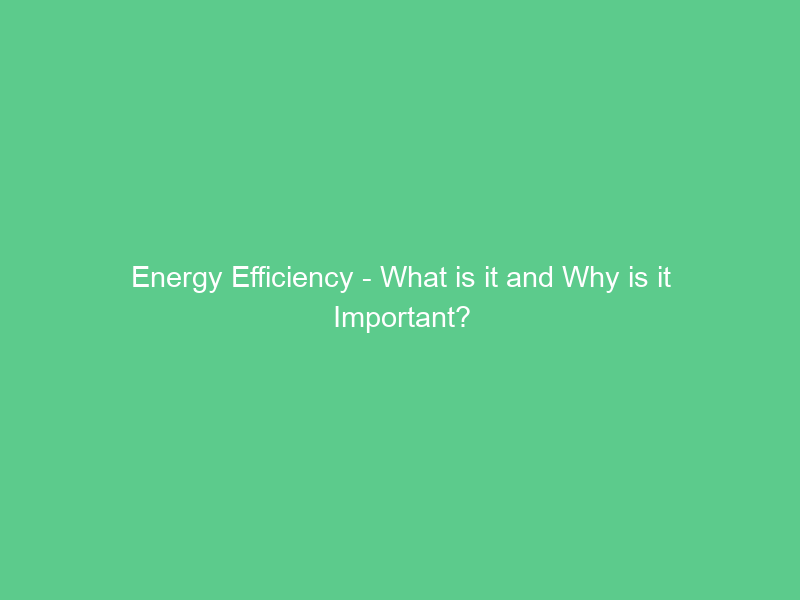Energy efficiency refers to using less energy for performing the same task. It’s an integral component of fighting climate change and can reduce pollution and costs significantly.
Energy efficiency is of particular significance in reducing carbon emissions from buildings and vehicles, offering one of the most cost-effective strategies for reaching net-zero emissions.
Energy efficiency is a market failure
Energy efficiency is one of the cheapest and easiest ways to reduce carbon emissions and save money. By using less energy, people and businesses alike can obtain services with lower upfront costs while reaping long-term energy cost savings. Unfortunately, energy efficiency has yet to become widespread, confounding researchers and policymakers; its implementation remains limited despite being seemingly simple; experts speculate on its possible causes such as market failures or hidden costs as possible explanations for its slow uptake.
Energy efficiency improvements can be cost-beneficial investments for building owners and tenants in commercial real estate (CRE), however their costs and benefits may not always align. Depending on a building’s predominant lease structure, investments may or may not match up perfectly with one another.
Transaction costs associated with CRE can be substantial for its stakeholders. These costs include time, uncertainty and risk; thus, it is vitally important to understand which factors either motivate or hinder the adoption of energy efficient technologies and policies. Raising awareness about energy efficiency while expanding access to reliable information will help eliminate these obstacles.
It is a market advantage
Energy efficiency is an indispensable market sector that brings multiple advantages to consumers, businesses, and the environment. Energy efficiency measures can lower electricity bills while simultaneously improving home comfort and occupant health; decreasing air pollution; strengthening energy security; and supporting economic development.
Reducing energy waste through increasing energy efficiency can reduce reliance on fossil fuels, thus lowering carbon dioxide emissions and improving air quality. In addition, increasing efficiency can also help stabilize electricity prices and mitigate price volatility; additionally it may enable consumers to delay or forgo new investments in power generation or transmission infrastructure – further decreasing energy demand and consumption.
Adopting energy-efficient technologies can reap significant financial returns for companies, which in turn leads to increased profitability and helps firms to remain competitive with other firms in their industry. A recent study concluded that employees of energy-efficient firms were more productive due to enhanced lighting and HVAC optimization as well as providing a more comfortable working environment.
It is a social responsibility
Energy efficiency is an indispensable tool in meeting environmental goals and improving human health. Energy efficiency reduces fossil fuel usage that releases greenhouse gas pollution while helping alleviate poverty in developing nations, cutting energy bills and providing economic and social advantages.
Energy efficiency can be improved in many ways, from switching to LED lights and using smart thermostats in homes to upgrading refrigerators, washing machines and dishwashers that consume less power. Many industries also adopt energy-saving technologies like high-efficiency motors and insulation in order to reduce energy use while hybrid and electric vehicles consume even less energy while decreasing pollution levels.
Governments and international organizations are making great strides toward energy efficiency. They set standards, fund efficiency projects, and educate people on its importance. Furthermore, governments and international organizations exert pressure on companies to reduce energy usage and increase energy efficiency; such efforts include restricting idling time by using more energy efficient appliances, shutting off equipment when not in use and switching off lights when not needed.
It is a legal obligation
Public bodies are required by various legal obligations to implement energy saving measures, with federal governments and states each being obliged to reduce final energy consumption by at least 2% each year – this undertaking involves using various strategies including electric vehicles and district heating systems as well as behavioral change techniques in order to meet this obligation.
Energy efficiency strategies can build brand image by showing that employees feel cared for. Furthermore, energy efficient practices may also help mitigate social impacts such as higher energy bills that disproportionately affect low-income households.
Buildings and cars have made notable advances in energy efficiency, with per-square-metre energy use decreasing by approximately 25% and fuel consumed per passenger kilometre decreasing by 10% or so respectively. Industrial energy intensity improvement rates remain slow – creating an obstacle towards reaching the goals established in Paris Agreement.

